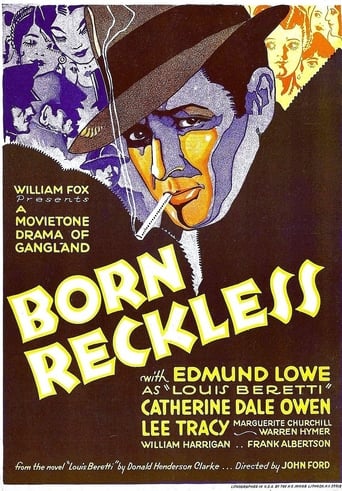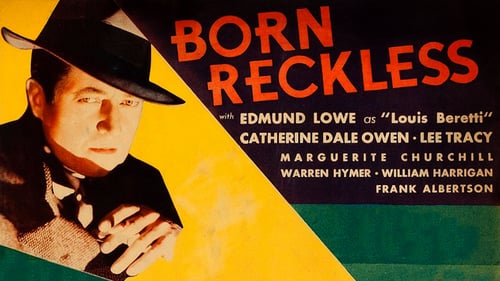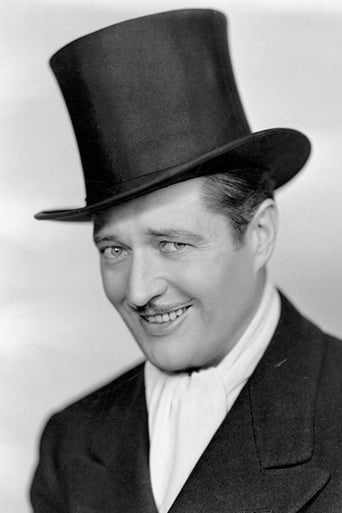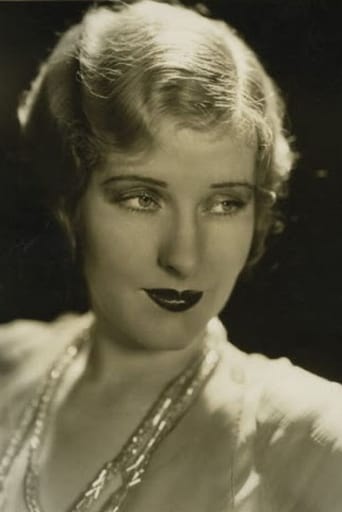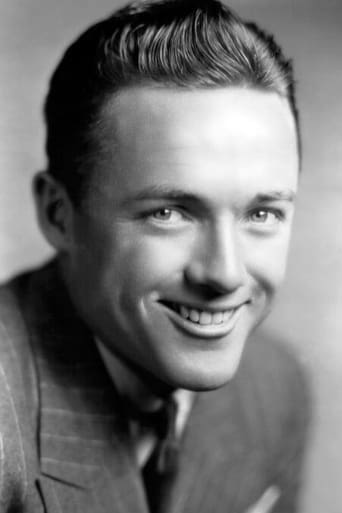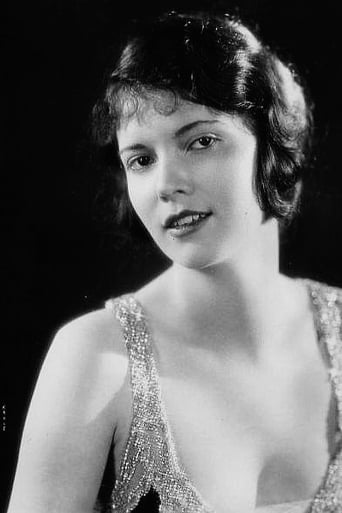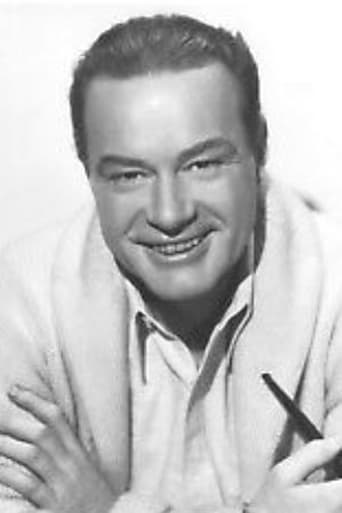Tedfoldol
everything you have heard about this movie is true.
Robert Joyner
The plot isn't so bad, but the pace of storytelling is too slow which makes people bored. Certain moments are so obvious and unnecessary for the main plot. I would've fast-forwarded those moments if it was an online streaming. The ending looks like implying a sequel, not sure if this movie will get one
Hattie
I didn’t really have many expectations going into the movie (good or bad), but I actually really enjoyed it. I really liked the characters and the banter between them.
Stephanie
There is, somehow, an interesting story here, as well as some good acting. There are also some good scenes
kidboots
While keeping a respectable blue collar working man front to his family, Louis Beretti (Edmund Lowe) is in reality a shady mobster who has managed to evade police - until now!! Faced with a stint up the river, a young reporter (razor sharp Lee Tracy) convinces the D.A. to send the jewel thief overseas to serve his country - if he makes good his bad record will be wiped!!It's a film that seems to be lost amid genres - starting off as a "public enemy" tale it then goes to War with Lowe donning his Captain Flagg mantle for a bit of insouciance amid the "war is hell" theme. Arriving back a hero - he decides to go straight so he opens a nightclub (complete with bootleg booze!!) but it takes all his strength to resist his old mob. First he finds out that his sister's husband has been gunned down by an embittered rival and while audience members know instantly who it is, it takes Beretti until the end of the movie and by that time he is up to his ears in hunting down a child who has been kidnapped by his old gang.William Fox with his love of gadgetry and his extravagance saw the merits in talking pictures before any other studio. In 1928 he was buying up theatre chains to equip them with sound, an act that would prove his undoing when the stock market crashed, but it did mean that by 1929 John Ford was backed up to take a gamble filming outdoor scenes. There was still an early talkies "experiment" that required two directors - one a seasoned silent director, the other usually an up and comer. Don't know who directed what on this movie set but it definitely wasn't John Ford's finest hour. As with Edmund Lowe who had still to perfect the debonair man about town persona that he would do so in a couple of year's time. His Beretti is too flip with not enough feeling and he is not helped by Catherine Dale Owen, surely the world's worst actress!! She was noted for her beauty but even though she (mercifully) only made a few films her acting didn't improve. She always seemed to me as if she was giving a speech from a podium, even when she was just saying hello!!Definitely the three best actors were Lee Tracy who kept all his scenes natural and terrifically had a pretty big part, Warren Hymer was his usual dependable self as "Big Shot", a childhood pal of Beretti and Frank Albertson in a small part as a wealthy, irresponsible enlisted man - he may have been annoying in a bigger part but as it was his giggling breeziness was just right!!
Michael Morrison
"Born Reckless" did not strike me as an appropriate title, but the original title of the story from which this movie came was simply "Louis Beretti," even more meaningless."Born Reckless" starts right out with action and even gunshots, but moves rather slowly throughout. But remember, this is an early sound picture, and in that context, it is very well done.Locations range from New York to the World War I battlefield of France and back, from urban New York to the countryside, and the look we get of the era makes "Born Reckless" valuable, if not an entirely entertaining motion picture.It has an excellent cast, with Edmund Lowe the star. He was a good actor but is little known today.However if you look carefully, you will see the biggest star of all time ... but you have to look VERY carefully. In fact, I never did see John Wayne, although he is listed in the "uncredited" cast here at IMDb.Quite visible, although also uncredited, is the great Randolph Scott. Also visible is the great Ward Bond, who is given billing but is on-screen in about two scenes.Known well to John Ford aficionados is Jack Pennick, quite visible also, and whose presence always added so much. Another future cowboy star I didn't see is Bill Elliott, uncredited.Playing the sister of the Lowe character is Marguerite Churchill, who had a couple years before co-starred with John Wayne in "The Big Trail," and it must have been interesting to be on this set with him as an unbilled extra.Lowe's character is not especially likable, and probably the most likable character is the newspaper guy, played by Lee Tracy.The cast alone makes "Born Reckless" very worth watching, even though the story is not very pleasant. It is, though, an interesting look at the World War I and Prohibition era America which, added to the cast, should entice you into watching.I do recommend it, having watched it On Demand from Time Warner Cable. There is a trailer for it at YouTube.
mark.waltz
It's a shame that this early talkie by John Ford is as poor as it is. The potential is there for an early "Little Caesar" and "The Public Enemy" (released only a short time later), but lacks the pacing of those similar gangster films which have become classics while this one just lays there. Fox Studios didn't have the same type of camera equipment as Warner Brothers did, and it shows. Tinny sound recording, a mostly grounded camera which barely moves, and lighting that only once in a while shows signs of life. The performances can be described as less than adequate, the actors all speaking their lines extremely slow, even such talented actors as Edmund Lowe, Warren Hymer and Lee Tracy, directed to draw out every word. The story covers World War I (with a bit of witty dialog here and there during the training sequences) through prohibition (with the most boring criminals imaginable) and bogs down in a mother love story that fortunately doesn't overstay its welcome. It also contains one of the most bizarre blunt endings I've ever seen in films, literally flashing "The End" titles without really even ending the scene it is in the middle of.
arthursward
With such fluid epics as "The Iron Horse" (1924), "Lightnin'" (1925), "Hangman's House" and "Four Sons" (both 1928) in his resume, it is surprising that Fox would encumber Ford with a dialogue director over and over, but Fox did. In '29's "The Black Watch" it was Lumsden Hare. Andrew Bennison is credited with the stage direction of "Men Without Women" released January 1930. Judging from the result Bennison achieved in "Born Reckless" (released in May 1930), I'm astonished anyone would have given him a second chance.The photoplay opens with a traveling camera shot of a parade. The camera prowls into a jewelry store where a heist is in progress. Outside, the cops "get wise" when a stolen truck is discovered. An exiting shootout and chase ensues, with our hero, Louis Berretti, gaining refuge at his parents' apartment. Then Bennison's stuff takes over. Well, molasses in Anchorage moves better and the pace of the film congeals. Berretti faces justice (eventually) and is "sentenced" to join the war effort overseas. John Ford stages some excellent sequences here, with Berretti's approbatory service delivering him home a hero. He opens a nightclub which, unfortunately, keeps Berretti rubbing elbows with his old mob and allows plenty scenes filled with Bennison-helmed hubris. The dialogue is not only awkward with head-shaking gaps, but has characters with names like Big Shot putting people "on the spot" [murdered].Audiences of 1930 could not fast forward but you can and should. Edmund Lowe's performance is nothing like the smooth "Chandu" of a year later and probably should be skipped over to view Ford's impressive set pieces. The swamp at the picture's conclusion cribs Fox's "Sunrise" but remains impressive for an early talkie. I gave it a 7 for Ford's contributions. On the whole, though, this is the kind of film that gave early TV viewers a bad taste for early talkies. Viewers beware.
